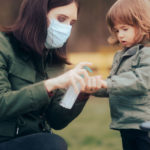Dental problems can start very early in life! Keep the following points in mind and you will start your child on a good dental habit to care for his teeth:
-Give your child healthy foods to reduce the cavity-causing germs in the mouth and if the baby has bleeding gums or cavities visit the dentist.
Also read What is Pediatric Dentistry?
– Brush the teeth with a toothpaste that contains fluoride.
– Your newborn baby does not have the bacteria that causes caries. Parents and/or caregivers pass on these germs through any activity that shares saliva. Do not blow on your baby’s food Do not use your spit to clean your baby’s pacifier – use water instead. Do not kiss your baby on the mouth!
– Starting at birth, clean your child’s gums with a soft infant toothbrush or cloth and water.
– As soon as teeth become visible, brush them with a small soft bristle tooth brush that contains a tiny smear of fluoride toothpaste until they reach 2 years of age. You should brush your baby’s teeth at least twice daily, Once in the morning and once at night.
Learn about The Importance of Primary Teeth
-Establish bed night routines that do not involve nursing, bottle filled with milk, juice or
any sugary liquids. Letting a baby sleep with the bottle or nurse continuously, if breastfeeding
– can cause serious dental cavities, called “Early Childhood Cavities.” It is
important to note that while many experts agree that breast-feeding is healthier for
your baby, breast milk can cause Early Childhood Cavities just as whole milk or formula
can.
– At will-breast feeding should be avoided after the first primary (baby teeth) begin to
erupt so should multiple bottle feedings during the night.
– At 6-12 months of age, babies should begin drinking from a sippy cup. At 12-14 months,
babies should be weaned from the bottle.
– If you see white spots developing on your baby’s teeth, take your baby right away to a
pediatric dentist. A white spot is often the first sign of dental cavity.
– In order to prevent dental problems, your child should see a pediatric dentist when the
first tooth appears, or no later than his/her first birthday.
Also check out How to Care for Baby’s Teeth






